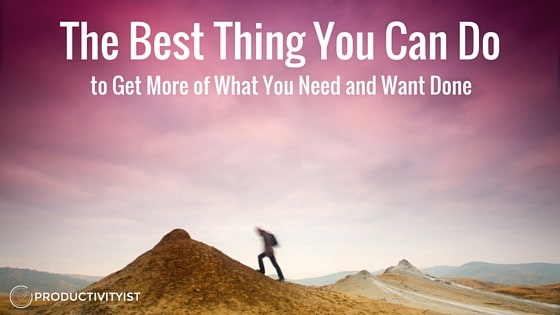
I’ve discovered several things in my years of studying productivity and time management. But one that always comes back around again and again is the amount of effort it takes to do what you need to do versus what you want to do.
You’d think that they would be equal – or close to being equal – but we tend to complicate that equation more often than not. That’s because we do the one thing we should never do to get what we need and want.
We settle.
We settle for less of the right stuff and more of the wrong stuff. We settle for the quick fix and compromise the long game in the process. We snack on small wins instead of feeding on big wins.
And this is what keeps us from really getting what we need and want.
Imagine if you stepped back and planned out your week with your partner at home, spending an hour every week on a meeting where you focus on three core components of household life: finance, food, and family. If you did that every week, you’d be able to map out your spending and savings. You’d be able to plan meals based on schedules and avoid the last-minute runs to the supermarket or fast food restaurant. And you’d know who had what going on – basketball practice, book club, a late night at the office – which would allow you to be prepared when those things arrived instead of deal with them ad-hoc. And you’d be able to spend the highly-recommended date night actually enjoying each other’s company rather than figuring out the grocery budget.
All of the above would keep you from settling. Settling on possible last-minute meals. Settling on unexpected expenditures that put a dent in the pocketbook. Settling on half-assed date nights because in the back of your head you are thinking about the business of the household.
There’s no need to settle if you set things up with a framework in advance that promotes importance over urgency. So find that framework (perhaps it’s TimeCrafting that can serve you). Explore tools that will help you have that weekly meeting (WorkLife is great for meeting agendas and the new Meeting Makeover program works for both home and work meetings).
Don’t settle.
Long term needs can’t be fulfilled in the short term. You need to stack them upon each other over time. Eating healthy today and then not doing so tomorrow only served the short-term need. (That’s why people say eating better isn’t a dietary choice but more of a lifestyle choice.) Programs like The Miracle Morning and The Night Owl Action Plan are designed to fulfill the needs of those who either want to make the most out of their mornings (The Miracle Morning) or designed to fulfill the needs of those who are wired (or forced) to stay up late (The Night Owl Action Plan).
Long term wants are even more reliant on willpower because they aren’t necessarily a requirement for you to survive. Sure, they will help you thrive but these short term wants are an easier “get” so they have an even greater chance of derailing you.
- You want to get in shape but you also want that soda pop
- You want to write that book proposal but you also want to see what’s going on Twitter
- You want to take your family to Disneyland but you also want to take them to McDonald’s tonight (because you don’t want to cook)
The more you combat the short term list, different challenges pop up. If you are winning the battle of one particular long term want (saving for a trip), the opportunity to buy something for yourself or your family that you feel you need comes along.
So how do you fight it? How do you keep from settling?
Give Each Month A Theme
The reason I theme my months and days is so short term wants and needs don’t push me off course. My brain has waypoints it can latch onto and those keep me from heeding the siren of short term stuff. Give your mind something simple and durable to attach itself to so that you can ward off the short term needs and wants when they don’t serve you.
Stay On Track Each Day
The Daily Themes pull me back into the overarching focus of each day. The Monthly Themes guide my daily activity so that I can make measurable progress on the larger goals I’ve set over a longer timeframe. Working by mode allows me to move multiple projects forward consistently, so nothing gets stale that serves either a long term need or a long term want. My mind doesn’t think about everything I need or want to do because it has indicators along the way that help it gravitate towards those things naturally – and I can use my energy to keep my focus on the bigger picture and use my willpower accordingly.
What does all of this mean? It means I do everything in my power to not settle for anything less than what I ultimately need and want to do.
That’s what we should be using all of these frameworks for in the first place…to do more of the right stuff for us. Right?
Ask yourself if you are investing time on making your long term needs and wants a reality or if you’re spending it on short term needs and wants that keep you further away from where – and who – you really want to be.
If you are settling for less than you deserve, then it’s time to put processes in place to help you stop. It doesn’t need to be complicated, it just needs to be put in place. And it needs to be put in place now.
Because another day where you settle for less means one less day where you can’t be more.

